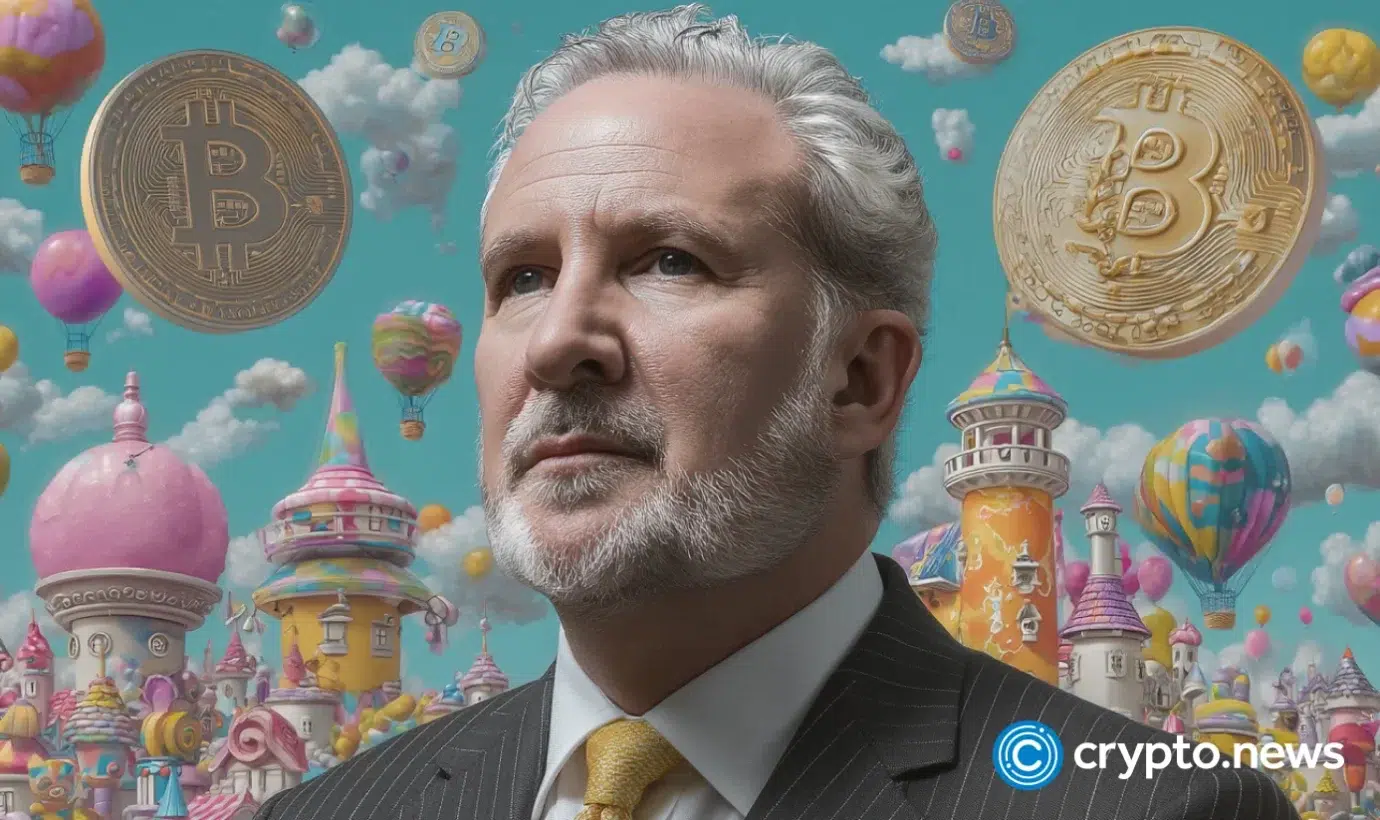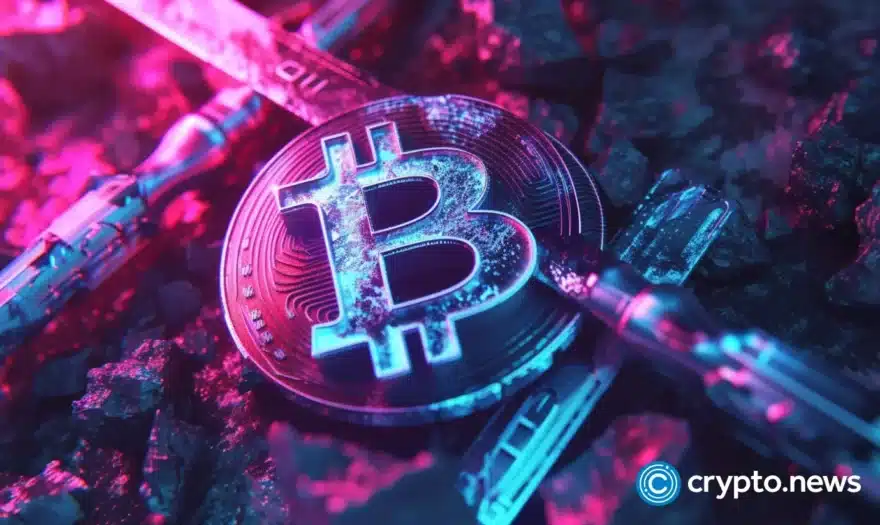“I told people not to buy Bitcoin — they bought more” — was Peter Schiff the most effective evangelist at Bitcoin 2025?

When even critics like Peter Schiff show up at Bitcoin 2025, has Bitcoin finally become too big to ignore — or too tempting to ridicule from within?
Table of Contents
JD Vance’s Bitcoin dreams collide with Peter Schiff’s Bitcoin cynicism
The Bitcoin 2025 conference unfolded in late May at the Venetian Convention Center in Las Vegas, drawing a wide cross-section of the global crypto community under one roof.
Held from May 27 to 29 and organized by BTC Inc., the event was billed as the world’s largest gathering of Bitcoin (BTC) advocates and brought together an eclectic mix of policymakers, investors, entrepreneurs, and open-source developers, all broadly united around the idea of accelerating global Bitcoin adoption
Attendees included prominent political and business figures such as Senator Cynthia Lummis, Vice President JD Vance, Eric Trump, and Strategy’s Michael Saylor, each offering a different lens into Bitcoin’s growing role in money, policy, and power.
Over three days, the event offered a sharp look at Bitcoin’s place in geopolitics, financial infrastructure, and institutional strategy.
Senator Cynthia Lummis called for clearer regulatory frameworks to encourage innovation. Vice President JD Vance praised Bitcoin’s ability to create new wealth outside traditional banking systems.
Michael Saylor, never one to pull back on conviction, laid out a timeline in which Bitcoin replaces gold and fiat entirely, forecasting a price of $13 million by 2045. Eric Trump spoke of family-led mining ventures, adding a layer of political proximity to the asset class.
Panels also dug into everything from layer 2 scaling to custody standards, while booths buzzed with startups pitching new solutions in payments, wallets, and decentralized ID.
And yet, amid this crowd of advocates and visionaries, one attendee stood out for an entirely different reason: Peter Schiff.
Known for his long-standing skepticism toward Bitcoin and his frequent warnings about its volatility and lack of intrinsic value, Schiff’s attendance caught many off guard.
What exactly did he say this time, and how has his relationship with Bitcoin evolved over the years? Let’s take a closer look.
Peter Schiff’s latest stunt at Bitcoin 2025
On May 28, during a fireside chat with journalist Natalie Brunell, Schiff delivered a set of remarks that stayed consistent with his long-held skepticism toward Bitcoin.
Known for his advocacy of gold and criticism of fiat currencies, Schiff opened the conversation with a pointed comparison, referring to Bitcoin as a “memecoin” rather than a meaningful store of value.
He argued that Bitcoin’s price is shaped more by speculative hype than by economic fundamentals, stating that it lacks the intrinsic value found in commodities like gold and silver.
Schiff questioned the widely promoted idea of Bitcoin as “digital gold,” a phrase frequently used by Bitcoin supporters to highlight its scarcity and decentralized nature.
To challenge that notion, he pointed to the behavior of central banks. “If gold is the past and Bitcoin is the future,” he asked, “why are central banks still accumulating gold and not Bitcoin?”
According to Schiff, gold continues to be the reserve asset of choice for governments and central banks precisely because of its physical and historical permanence.
He also used the platform to revisit broader economic concerns, reiterating his long-standing warnings about the U.S. fiscal trajectory. He criticized the growing national debt and rising inflation, describing them as symptoms of a deeply fragile monetary system.
However, in contrast to many Bitcoin advocates at the conference, Schiff dismissed Bitcoin’s role as a hedge in such scenarios. He argued that Bitcoin’s price swings and lack of intrinsic utility undermine its reliability during crises, especially when compared to tangible assets like precious metals.
One of the more widely discussed moments of the session came when Schiff humorously reflected on his role in Bitcoin adoption. “Every time I tell people not to buy Bitcoin, they buy more,” he said.
He then added, “I’m probably responsible for more people owning Bitcoin than anyone else at this conference,” sparking humour and amusement among the attendees.
Schiff also responded to Vice President Vance’s assertion that Bitcoin had created unparalleled wealth over the past decade.
He disagreed with the premise, suggesting that what Bitcoin enables is not wealth creation in the traditional sense, but rather a transfer of value from those entering early to those entering late, mirroring a pyramid-like structure rather than genuine economic innovation.
Peter Schiff’s Bitcoin saga began long before the crypto conference invite
As chairman of SchiffGold and chief economist at Euro Pacific Capital, Schiff has repeatedly rejected the notion that Bitcoin holds any intrinsic value, often referring to it as a modern-day financial fad.
His criticisms began early, long before digital assets gained mainstream attention, and have consistently drawn on historical comparisons.
He compared Bitcoin to speculative bubbles such as the Dutch tulip mania of the 1600s, suggesting that enthusiasm around crypto is driven more by fear of missing out than by rational investment fundamentals.
In 2019, Schiff was openly dismissive of projections that Bitcoin could one day reach $100,000, famously calling it “digital fool’s gold” and predicting it would eventually “go to zero.”
When Bitcoin did cross the $100,000 mark in December 2024, he did not revise his stance. Instead, he attributed the rally to political influence and institutional lobbying, stating on social media that the price surge came from “buying off politicians and getting in bed with the government,” rather than genuine market confidence or fundamental strength.
In March 2025, he announced what he called a “Strategic Bitcoin Reserve,” referencing the U.S. government’s own reserve strategy.
“Just like the U.S. government, I’m developing a budget-neutral strategy for acquiring my bitcoin at no incremental cost,” he wrote, before posting a wallet address and inviting contributions.
Soon after, he followed up with another remark: “So far my Strategic Bitcoin Reserve is still empty. But I’m developing a Digital Asset Stockpile too. Several people have already sent me Solana. It seems that blockchain is much faster than Bitcoin.”
Volatility is another area of concern in Schiff’s analysis. In April 2025, he noted that the U.S. Bitcoin Reserve had declined 12% in a single month while gold had gained 2%, using it to argue that Bitcoin cannot serve as a stable hedge in periods of financial stress.
His critique gained more traction when he predicted that the same financial system crisis that had once helped fuel Bitcoin’s rise in 2008 could now be the reason for its downfall. “Bitcoin was born out of the financial crisis of 2008. Ironically, the financial crisis of 2025 will kill it,” he stated.
Schiff’s skepticism also extends to individual players in the space. He has frequently criticized Saylor’s aggressive Bitcoin acquisition strategy at Strategy, calling it financially irresponsible.
He has also poked fun at the broader crypto culture. In one instance, he claimed Dogecoin (DOGE) might be more honest than Bitcoin because its “open stupidity” makes it less misleading.
Despite his critiques, Schiff’s consistent engagement with Bitcoin has led to ongoing speculation about his true position. Anthony Pompliano and others in the crypto community have jokingly suggested that Schiff secretly admires Bitcoin’s staying power, though Schiff has repeatedly denied this.
A lonely contrarian at Bitcoin 2025
Schiff’s decision to attend Bitcoin 2025 came as a surprise to many in the crypto world. On May 26, he confirmed his involvement, stating that he would be presenting “contrarian opinions” at the event.
“I’m off to Las Vegas for the Bitcoin conference this morning, where, ironically, I’ll likely be the speaker who best understands Bitcoin,” he posted on X.
When asked on social media why he was attending an event centered on a technology he frequently criticizes, Schiff offered a direct answer. “It’s better to present contrarian opinions. What good is an echo chamber?” he responded, before adding that he would “bury” Bitcoin in the conversation.
The tone extended beyond the post. Schiff was photographed at the conference wearing a red cap reading “Make Bitcoin Great Again,” a clear signal that he had come prepared to provoke discussion.
On the ground at the Venetian Convention Center, Schiff shared an image of his small booth at the exhibit hall and noted, “By the time Bitcoin crashes for good, maybe I’ll be the one with the fancy booth.”
Some Bitcoin advocates accused him of “engagement farming,” suggesting that he frequently mentions Bitcoin to drive attention rather than out of genuine interest. Others speculated, as they have for years, that he holds Bitcoin privately despite his public disapproval.
That speculation intensified in April 2025, when Schiff’s investment firm, Euro Pacific Asset Management, was found to have indirect exposure to a Bitcoin-backed bond through Samara Asset Group.
What made Schiff’s presence even more notable was the lack of other critical voices on stage. Most speakers at Bitcoin 2025 promoted the asset’s benefits, future potential, and role in reshaping finance.
Schiff was one of the only participants to challenge that narrative openly. His debate with Natalie Brunell during the fireside chat served as the conference’s clearest example of intellectual opposition.
Brunell urged him to reevaluate his position, suggesting he might eventually recognize Bitcoin’s merit. Schiff replied with a familiar stance: “I’m waiting for my moment to say ‘I told you so.”
Audience reactions have been mixed. Some enthusiasts, as noted in community forums like Reddit, felt that including Schiff gave the event more credibility, encouraging open debate. Others questioned whether his participation undercut the conference’s mission.
Regardless of interpretation, in 2025 even the strongest critics have become part of the larger Bitcoin conversation, shaping its evolution not just from the sidelines, but from within the room.
















